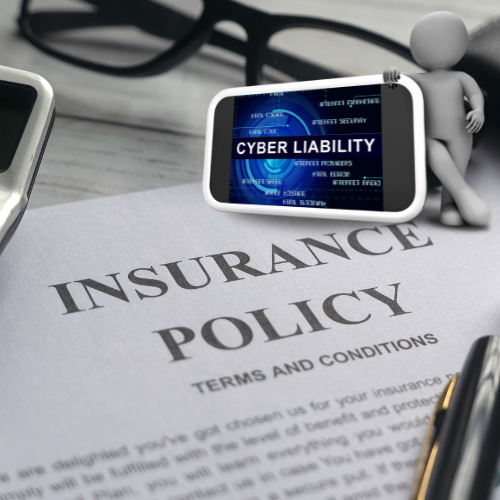
What You Need to Know
Safeguarding Against Modern Threats
In today’s hyper-connected world, businesses of all sizes are exposed to the risks posed by cyber threats. From data breaches and hacking incidents to ransomware and fraud, the consequences of a cyber attack can be devastating.

While securing your systems is essential, it’s equally important to ensure your business is protected financially when cyber incidents occur. That’s where Cyber Liability Insurance comes in.
Cyber Liability Insurance is designed to provide coverage for the financial losses associated with data breaches, cyber-attacks, and other online threats.
It helps businesses manage both first-party expenses (internal costs) and third-party liabilities (claims from customers or other entities) related to cyber incidents.
Internet Liability and Network Protection: Key Coverage Areas
Cyber Liability Insurance offers several crucial protections to help businesses recover from cyber threats. Here are the main types of coverage included:
1. Website Publishing Liability
Covers liability resulting from unintentional errors or misstatements published on the insured’s website. This includes copyright infringement, defamation, or privacy violations.

2. Network Security Liability

Protects the business in cases where unauthorized access to your computer system leads to the theft or exposure of sensitive data.
This also covers the transmission of viruses or malware to third parties unintentionally.
3. Replacement or Restoration of Electronic Data
Covers the cost to restore or replace data that’s been lost or damaged due to malicious activities such as viruses or other forms of cyber-attacks.

4. Cyber Extortion

Provides protection against cyber extortion events, such as ransomware attacks, covering ransom payments and expenses related to handling these threats.
5. Business Income and Extra Expense
Covers lost business income and additional expenses incurred due to a cyber event that interrupts your business operations, such as a virus or ransomware attack that shuts down your network.

Understanding First-Party vs. Third-Party Coverage
Cyber Liability Insurance
Typically includes both first-party and third-party coverage, ensuring comprehensive protection.
First-Party Coverage

First-party coverage focuses on the direct financial losses your business may experience as a result of a cyber incident. This includes:
- Data Recovery: Covers the cost to restore or replace lost data.
- Business Interruption: Reimburses for income lost during downtime caused by a cyber event.
- Cyber Extortion Payments: Pays for expenses and ransom demands during ransomware attacks.
- Reputation Management: Covers public relations costs to mitigate reputational damage.
- Notification Costs: Covers the cost of notifying affected individuals after a data breach.
- Credit Monitoring: Pays for credit monitoring services offered to those whose personal information was exposed in a breach.
Third-Party Coverage
Third-party coverage focuses on liability claims made against your business by external parties, such as customers or partners, due to a cyber incident. This includes:

- Network Security Liability: Protects against claims resulting from the failure to prevent unauthorized access or transmission of malicious software.
- Privacy Liability: Covers legal claims arising from the breach of personal or confidential information.
- Media Liability: Covers defamation, copyright infringement, or other media-related claims.
- Regulatory Defense and Penalties: Covers the cost of defending your business against regulatory actions and any resulting fines.
Key Additional Coverage Options
As cyber risks evolve, so do the types of coverage available. Here are additional features you may want to include in your Cyber Liability Insurance policy:
1. Regulatory Coverage

Provides protection against fines, penalties, and legal costs associated with non-compliance with data protection laws like GDPR, CCPA, or HIPAA.
This includes costs related to regulatory investigations.
2. Social Engineering Fraud

Protects your business from financial losses caused by social engineering attacks, such as fraudulent wire transfers initiated through phishing schemes or impersonation.
3. Reputational Damage

Covers public relations and crisis management expenses to help manage the impact of a cyber incident on your business’s reputation.
4. Payment Card Industry (PCI) Fines and Assessments

Specifically designed for businesses that process credit card transactions, this coverage addresses fines and penalties resulting from breaches involving payment card data.
5. Contingent Business Interruption

Provides coverage when your business is impacted by a cyber event at a critical vendor or partner, causing operational disruptions for your company.
6. Cyber Terrorism

As cyber-attacks increasingly become a geopolitical issue, this coverage addresses losses resulting from acts of cyber terrorism.
Post-Breach and Pre-Claim Services
Many modern Cyber Liability Insurance policies offer both pre-claim and post-breach services, giving businesses access to critical resources before and after an attack.
Pre-Claim Assistance
- Risk Assessments: Evaluate your current cybersecurity posture and identify vulnerabilities.
- Security Recommendations: Advice on strengthening defenses and closing security gaps.
- Incident Response Planning: Assistance in developing robust incident response strategies to minimize damage in the event of a breach.
- Employee Training: Access to cybersecurity awareness training programs to help staff identify and avoid common threats.
- Vulnerability Scanning: Automated scans of your network to detect weaknesses.
- Phishing Simulations: Tests designed to help employees recognize and resist phishing attacks.
Post-Breach Services
- Breach Coach: A cybersecurity expert who guides your business through the incident response process.
- Forensic Investigation: Experts who analyze the breach, determine its cause, and assess the extent of damage.
- Legal Support: Provides access to legal experts specializing in cyber incidents to help navigate regulatory requirements and minimize legal exposure.
- Public Relations: Crisis management professionals help control the narrative and protect your business’s reputation.
- Notification and Call Center Services: Assistance with notifying affected individuals and setting up hotlines for inquiries.
- Data Recovery: Support in recovering or restoring compromised data.
Why Cyber Liability Insurance is Essential for Businesses in Miles City
Protection Against Modern Threats
With increasing reliance on digital tools and online services, businesses are more vulnerable than ever to cyber attacks.

Hackers, ransomware, and data breaches can lead to severe financial losses, legal issues, and reputational damage.
Cyber Liability Insurance is designed to provide financial protection and expert support when these incidents occur.
Maintaining Compliance with Data Protection Laws
In today’s regulatory environment, businesses that handle sensitive customer data must comply with strict data protection regulations.

Cyber Liability Insurance offers coverage for fines, penalties, and legal costs associated with non-compliance, helping your business navigate the complexities of data protection laws.
Comprehensive Risk Management

By providing a combination of first-party and third-party coverage, Cyber Liability Insurance offers holistic protection.
Whether it’s recovering from a ransomware attack, managing the fallout from a data breach, or defending against customer lawsuits, this coverage ensures your business can respond effectively to cyber threats.
Building Trust Through Security
In a world where cyber threats are becoming increasingly sophisticated, Cyber Liability Insurance is an essential tool for businesses in Miles City, Montana.

It’s not just about recovering from a breach; it’s about being prepared, protecting your business, and ensuring that your customers can trust you with their personal information.
By investing in cyber insurance, you take a proactive step in safeguarding your business from modern threats.
FAQs
What is Cyber Liability Insurance?
Cyber Liability Insurance protects businesses from financial losses due to data breaches, cyber-attacks, and other online threats. It covers both direct losses (like data recovery) and third-party liabilities (like customer lawsuits).
Does Cyber Liability Insurance cover ransomware attacks?
Yes, many policies include coverage for ransomware, which may cover ransom payments and the costs associated with resolving the attack.
What is the difference between first-party and third-party coverage?
First-party coverage protects your business’s own assets and income, while third-party coverage addresses claims from customers or external parties due to your business’s cyber incident.
How does Cyber Liability Insurance help with regulatory compliance?
Many policies include coverage for legal costs, fines, and penalties resulting from non-compliance with data protection laws like GDPR and HIPAA.
Can I get coverage for cyber-attacks on vendors that impact my business?
Yes, contingent business interruption coverage protects you if a key vendor’s cyber incident disrupts your business operations.
Your Solution Starts Here

At Armor Insurance Agency, we believe in helping businesses in Miles City, Montana, stay protected against modern threats through education and customized insurance solutions.
Cyber Liability Insurance is a vital step in safeguarding your company’s future.

